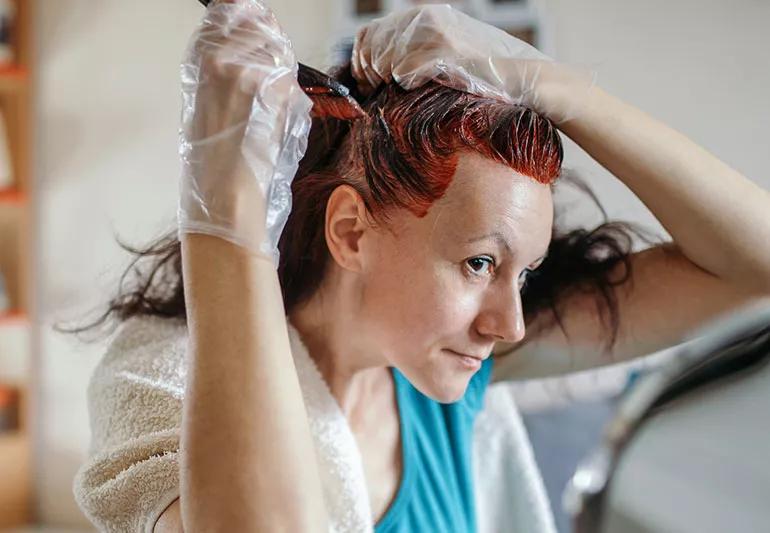Research shows some associations and concerns, but no definitive connections

Wanting different-colored hair is nothing new. In ancient Egypt, henna dye was used to highlight hair (or cover unwanted grays). Hair dye found its way onto the heads of people in ancient Greece, too.
Advertisement
Cleveland Clinic is a non-profit academic medical center. Advertising on our site helps support our mission. We do not endorse non-Cleveland Clinic products or services. Policy
But while the goal of getting a new look has been around for many millennia, the method has certainly changed. Natural ingredients behind those old dye methods have been largely replaced by chemicals — including some linked to increased cancer risk.
So, does that mean modern hair dyes can be bad for your health? Let’s look at the research with radiation oncologist Chirag Shah, MD, and medical oncologist Tiffany Onger, MD.
Changing your hair color isn’t easy. Want proof? Consider this: It can take more than 5,000 chemicals for hair dye to get the job done.
The list features known carcinogens, or substances that can cause cancer. These chemicals can disrupt the actions and levels of hormones in your body and elevate cancer risk, says Dr. Shah.
Concerning chemicals include aromatic amines, 3-amino-4-methoxyaniline, 2-nitro-4-aminoaniline and 3-nitro-4-hydroxyaniline.
Permanent hair dyes, which make up about 80% of the market, typically have more chemicals than semi-permanent and temporary hair dyes. Darker hair dyes often have higher concentrations of chemicals and carcinogens, too.
Various studies over the years have investigated potential connections between hair dye and different types of cancer, such as:
Advertisement
“There are obvious concerns,” says Dr. Onger. “The reality is that people are applying hair dyes to their scalp, and we know those hair dyes include chemicals. That’s why there has been so much research.”
Results of those studies have been mixed, with some associations found.
But overall, the International Agency for Research on Cancer (IARC) with the World Health Organization (WHO) has determined that personal use of hair dye “is not classifiable as to its carcinogenicity to humans.” (That’s a fancy way of saying there are no actionable links.)
It should be noted, however, that the IARC did find increased risk for hairdressers or barbers who are in more frequent contact with hair dyes. The agency listed that sort of on-the-job exposure as “probably carcinogenic.”
Let’s look at the connections and risk by cancer type.
Most studies haven’t detected an increase in bladder cancer risk for those who get their hair dyed, according to the National Cancer Institute. But there have been a few concerns raised about the use of permanent hair coloring.
Risk levels for bladder cancer do appear to rise if you work with hair dye on a regular basis.
Video content: This video is available to watch online.
View video online (https://cdnapisec.kaltura.com/p/2207941/sp/220794100/playManifest/entryId/1_o6b7tlqm/flavorId/1_5f3sgelj/format/url/protocol/https/a.mp4)
A relatively large National Institutes of Health study in 2019 examined the relationship between breast cancer and the use of hair dye and chemical hair straighteners. The Sister Study involved more than 45,000 women.
Researchers found that:
Some research has suggested that semi-permanent hair dye may affect breast cancer risk as well. Interestingly, the Sister Study showed mixed results on usage.
While semi-permanent dye wasn’t connected with higher risk overall, those who used semi-permanent dye themselves — without the assistance of a professional hairstylist — had an association with breast cancer risk.
When it comes to chemical hair straighteners, the Sister Study found some increased breast cancer risk. (Some of these straighteners contain formaldehyde, a known carcinogen.)
Straightener use in the 12 months before enrollment in the study was associated with an 18% higher breast cancer risk. More frequent use brought higher risk, too. For example, those who used straighteners every five to eight weeks had a 31% higher breast cancer risk.
Advertisement
“Not statistically significant” sums up much of the research results involving hair dye and the risk of other cancers, such as non-Hodgkin lymphoma, leukemia and uterine cancer.
Every single day, you’re exposed to many things that are potential cancer risk factors. Hair dye is just one item on the list, say Dr. Shah and Dr. Onger.
If you’re concerned about your risk of cancer, look at all of your risk factors when making decisions. Talk to your healthcare provider about your lifestyle, home and work environments, and family history so you can decide what’s best for you.
Hair dye can certainly be part of that discussion — but it shouldn’t be the only thing.
Advertisement
Learn more about our editorial process.
Advertisement

Rosemary oil’s antioxidant, anti-inflammatory and antimicrobial properties could help stimulate hair growth

Scalp cancers can occur because of long-term sun exposure

Soften your skin with warm water and shaving cream before shaving with the grain of the hair

Age is the most likely reason for typical graying, but premature graying may be caused by stress, diet, smoking or autoimmune disease

Focus on nutrition, gentle styling habits and adapting to your hair type

Eating whole grains, salmon, fruits and vegetables can help you achieve longer, healthier locks

Your genes, ethnicity, diet and stress levels may all affect your facial hair

Your hair removal routine will depend on your pain tolerance, budget and skin sensitivities

The tropical fruit is a good source of antioxidants and vitamin C

Most people fall asleep within 10 to 20 minutes, but if your experience is different, adjusting your sleep schedule may help

Exploring your hidden side can lead to better understanding of what makes you tick